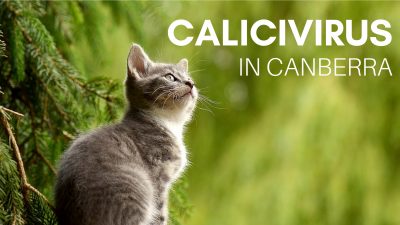Two viruses, one a new strain and the other a resurgence of an old virus are causing concerns for our feline friends and their owners around Canberra.
Virulent strain of cat flu (feline calicivirus)

In March this year and now again in June/July, vets around Canberra have seen sick cats suffering from a particularly virulent form of a cat flu virus, FCV-VSD (Feline calicivirus – virulent systemic disease)
While typical signs of flu in cats include mouth ulcers, sneezing and perhaps lameness, the virulent strain can cause a much more severe illness. Signs are usually more severe in adult cats than in kittens and fatalities are common. Whilst the normal flu vaccination may offer some protection, even fully vaccinated cats can succumb to the virulent strain.
Affected cats show some or all of the following signs – loss of appetite, lethargy, high fever, swollen limb(s) and/or head, jaundice, difficulty breathing, mouth ulcers and sores on the nose, ear tips and skin. These signs are similar to those reported in previous outbreaks in the US and Europe.
Fortunately, most infected cats in Canberra have recovered due to prompt diagnosis and supporting treatment.
The virus can survive in the environment for around one month. It is highly contagious and spreads easily to other cats via hands, clothing, shoes, bedding, food bowls and litter trays. The greatest risk of spread occurs in multi-cat environments such as shelters and boarding catteries. Fortunately spread in the wider community has been limited and the outbreaks seem to ‘burn out’.
Researchers at Sydney Uni are investigating the virulent strain and vets have been submitting mouth swabs from any suspect cases for testing.
If your cat is showing any of the signs listed above, please call us on 62302223 to arrange an appointment. An initial assessment may be done in the car by a vet kitted out in gloves and disposable gown to minimise the risk of spreading the virus.
Feline enteritis
The resurgence of the deadly virus, FPV (feline panleukopenia virus) which was almost eradicated 40 years ago by vaccinations, has been confirmed in various locations throughout Australia, including Melbourne and Canberra.
FPV is highly contagious and can be fatal to the affected cat.
The most common form of FPV presents as a three to four day history of high temperature, lethargy, loss of appetite and may progress to vomiting and diarrhoea. However, in cases of very severe infection, cats can die very suddenly with no apparent signs.
FPV in cats is caused by parvoviruses, which are small DNA viruses. The main one is feline panleukopenia virus but parvoviruses that infect dogs can also cause the disease in cats.
Disease control relies on strong herd immunity and that can only be achieved by keeping pets up-to-date with their vaccinations.
We recommend that kittens are vaccinated starting from 6-8 weeks of age and then every 4 weeks until they are 16 weeks old.
Cats receiving their first vaccination after 16 weeks of age only need one dose with a booster at 6-12 months and then every three years thereafter.
The modified live F3 vaccine used at Hall Veterinary surgery provides highly effective protection against this virus.
PLEASE NOTE:
Strict disinfection procedures have been implemented at the surgery so please do not be offended if we ask you to leave your cat in the car and phone us when you arrive for your appointment, we have your cat’s health as our top priority.
